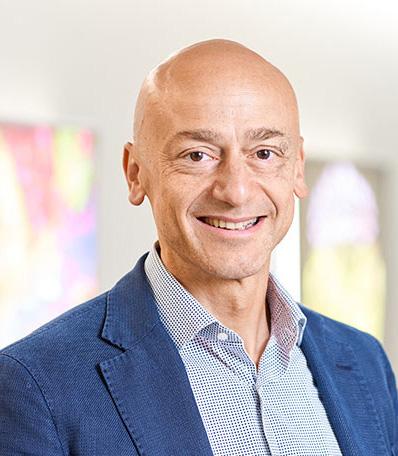
5 minute read
Biomedizin: Alle Ampeln stehen auf Grün»
Dear All,
Even to those who are not highly familiar with the German language, this title of the UniBas News on May 2, 2023 should evoke both a positive emotion and a provocative unease. Yes, the final green lights for the construction project of our new building have been set by the parliaments of the two supporting Canton of Basel-Stadt. The increase in the financial commitment has been agreed upon, the contract with the sole constructor company Implenia has been signed and the construction work is set to begin in September 2023!
Advertisement
Although it will still take a few years before the building is functional and populated by the DBMers, this milestone should induce us to reflect on our responsibility to get ready for that time. We clearly have several technical planning and implementation actions in front of us… but also the challenge to further develop our cultural and scientific identity, while maintaining our substantial diversity. This implies to be creative on how to leverage at best the opportunity of short-distance interactions between clinical and scientific profiles across many biomedical disciplines and competences. It is in this spirit that I encourage you to read the section in this newsletter “What does the DBM mean to you?” and to try and elaborate your own very personal answer.
The present issue also profiles a well-established (Markus Heim’s) and a recently settled as independent (Arnaud Scherberich’s) research group, a success story by Bentires’ Lab – yes, yet another one! – and highlights the opportunities for postdocs, as “a main pillar of research” to personally interact and professionally develop thanks to their active club.
I love the snapshots taken at our plenary events and can only encourage you to already schedule in your agenda the next one: the DBM Summer Symposium + Summer Party, which will take place on August 17.
I hope you find some time to ‘refresh’ your spirit during the ‘warm’ upcoming summer days. Happy reading!
Ivan Martin Director of the Department of Biomedicine

7 Statements
For me, the DBM combines an exciting combination of scientific topics and research as a platform for interested multicultural young people who want to develop their professional skills.
Success Story
PostDoc
Editorial Events
Club
Said in one sentence: It`s part of my life...
Being employed at the DBM for 19 years, I‘ve witnessed the development of a new department with modern infrastructure, and I believe the new building will be a milestone for excellent research.
Even after almost 17 years, I still have the feeling I‘m working in the right place. It never gets boring or monotonous. My area of responsibility is very broad, diverse and varied. It is also the contact with so many people that makes my job so exciting.


The DBM to me is a valuable and inspiring scientific environment. It offers contact and collaboration opportunities with excellent groups covering a multitude of different research foci and expertise. Another clear advantage is the easy and rapid access to high-end core facilities. The DBM structure played a decisive role in shifting my lab’s research to a more translational perspective within the last years.
The DBM is actually what made me stay in Basel. I enjoy the interdisciplinary environment, the atmosphere and the convenience of having all facilities under one roof. Indeed, we have very helpful and professional core facilities, which I truly missed in my previous institute. Moreover, being located in the heart of the city and getting to meet a lot of nice people also helps me enjoy my everyday lab life.
The DBM is a place where research and innovation thrive. Over the past five years, I have had the pleasure of working with insightful and brilliant colleagues while working on exciting projects. What sets the DBM apart is its ability to bridge the gap between basic research and clinical research, which is a key strength of the institution. The stimulating environment at the DBM enables you to push the boundaries of knowledge and conduct pioneering research.
The DBM is a second home to me. I feel connected to people around me, even though we have different languages and cultural backgrounds. The access to facilities for pursuing science is a big deal and I feel blessed to be in a place where most of the facilities are available in-house at the DBM. I always wonder about the driving forces (Group leaders, Management team, IT, Logistics, Communications team, Facilities) behind the department and wish I could also contribute back to the DBM in such as a way.

Content
How dietary supplement helps combat resistance in breast cancer.
Background and Research question
Targeted therapies have undoubtedly changed the prognosis of many breast cancer patients. However, especially in advanced stages of the disease, resistance to targeted therapies is frequent and prevents longterm treatment success.
One of the most frequently activated oncogenic pathways in breast cancer, is the PI3K signaling pathway. Over the last decade numerous inhibitors were developed to target this pathway. One example of such an inhibitor is alpelisib, a drug that is approved also in Switzerland as a treatment for patients with advanced breast cancer and hyperactive PI3K. Our objective was to investigate genetic alterations that lead to resistance to PI3K inhibition and explore potential strategies to overcome this resistance through combinatory treatments.
Study method
Publications
Editorial Events Research Group at a Glance
Using an in vivo screening tool, we found that the genetic loss of the gene neurofibromin 1 (NF1) reduced the sensitivity of cancer cells to alpelisib. We also confirmed this finding in vivo and using patient-derived cancer cells. Moreover, we observed that cancer cells lacking NF1 show lower energy consumption via mitochondria and that they depended on other energy sources. This results in lower reactive oxygen species in those cells. We hypothesized that an antioxidant like N-acetylcysteine could mimic the effects of NF1 loss. Surprisingly, we observed the opposite effect and found that N-acetylcysteine restored the effectiveness of alpelisib in resistant cancer cells by dampening mTOR signaling.
Relevance for cancer patients and importance of the study
New Colleagues
Breast cancer is the leading cause of cancer-related deaths among women, with approximately 2.1 million new cases diagnosed each year. Genetic alterations in the NF1 gene occur in about 6% of breast cancer patients. In patients with advanced, metastatic disease, the percentage increases to 11%. We and others showed that loss of NF1 is not only associated with resistance to PI3K inhibition, but also to other therapies, indicating that this genetic lesion has significant clinical relevance.
Outlook
In a next step, it would be crucial to explore if similar effects are observed with other PI3K inhibitors, which were not investigated in the current study. Additionally, apart from the initial in vivo mutagenesis screen, we performed follow-up experiments in immunocompromised settings. Future studies should investigate the effects of NAC also in immunocompetent models.
Ultimately, clinical trials involving breast cancer patients would be required to determine the clinical effectiveness of combining alpelisib with N-acetylcysteine is clinically effective.

Contributors
Apart from the great collaborative efforts within our lab, we were fortunate to receive technical, experimental, and scientific support from multiple labs within the DBM, particularly from the Zippelius lab. Moreover, we could always rely on expertise and support from various core facilities at the DBM, the University of Basel, and the Friedrich Miescher Institute. In the initial stages of the project, collaborations with the Technical University of Munich and Novartis were of particular importance.
A short overview of the Tumor Heterogeneity Metastasis and Resistance Lab

Under the leadership of Mohamed Bentires-Alj, our lab investigates various aspects of breast cancer. Our projects encompass studies on breast and mammary gland biology, cancer initiation, disease progression and resistance to therapies. Additionally, we explore tumor intrinsic factors and changes in the tumor microenvironment that may contribute to disease progression.
Through the Swiss Personalized Health Network and local collaborations with clinicians at the University Hospital of Basel, clinical and molecular information, as well as tumor samples from cancer patients are collected, which should ultimately enable more precise diagnoses and thus treatments tailored to individual patients.

Original Publication
Bentires Lab
Bentires Lab at the DBM








